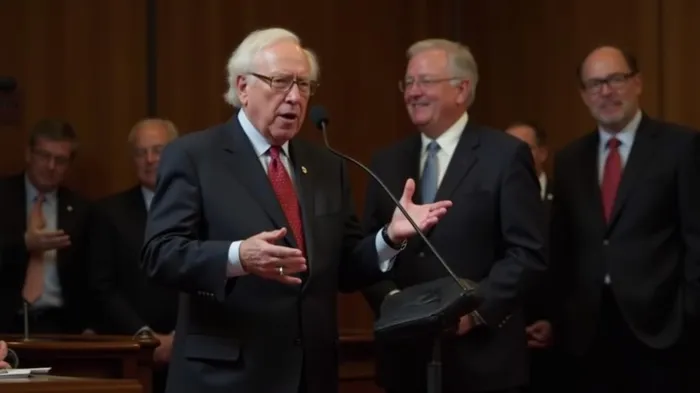Warren Buffett Steps Down After 60 Years, Names Greg Abel Successor
Warren Buffett, the legendary investor and CEO of Berkshire HathawayBRK.B--, has announced his decision to step down from his role at the end of the year, marking the end of a 60-year tenure where he transformed Berkshire from a struggling textile company into a massive conglomerate. Buffett, who has been at the helm since 1970, made the announcement during the company's annual meeting, where he also recommended Greg Abel, the current vice chairman overseeing non-insurance businesses, as his successor.
Buffett's decision to step down was a surprise to many, as he had previously expressed his desire to continue leading the company. However, he acknowledged that the time had come for a new leader to take the reins. "I think it's the time has arrived where Greg should become the chief executive officer of the company at year-end," Buffett stated. He also mentioned that he would still be available to offer assistance in certain cases, but the final decisions would rest with Abel.
The transition process will begin with a board meeting scheduled for the following day, where the recommendation will be discussed. Abel, who was identified as Buffett's successor back in 2021, was not informed of the plan beforehand, indicating that the decision was made relatively recently. Buffett also clarified that he has no plans to sell any of his shares in Berkshire Hathaway as part of this transition.
Buffett's leadership has been instrumental in Berkshire Hathaway's growth, with the company's per-share value compounding at a significant rate since his takeover. This performance significantly outpaces the average annual gain of the S&P 500. Under Buffett's guidance, an investment of $10,000 in Berkshire in 1965 would now be worth over $500 million.
During the annual meeting, often referred to as the "Woodstock for Capitalists," Buffett shared his views on a range of topics, including investment strategy, global trade, and the U.S. fiscal deficit. He emphasized that balanced trade is essential and that the U.S. must remain connected to the world economically. Despite market turbulence and political challenges, he noted, “I would not get discouraged.”
Reflecting on America’s economic power, Buffett called himself lucky for being born in the U.S. and stressed the strength and resilience the country has shown through wars, recessions, and historic developments. He also warned about the U.S. fiscal deficit, calling it “unsustainable” and highlighting the threat it poses to long-term stability.
On investing, he revealed Berkshire nearly spent $10 billion recently and is open to spending even more when the right opportunity arises, admitting, “We're running a business which is very, very, very opportunistic.” He contrasted this with real estate, which he finds slow and less attractive due to complex ownership issues and long negotiations.
Buffett also touched on the U.S. energy grid, saying major improvements are needed and comparing the situation to the urgency and innovation seen during World War II. He believes Berkshire’s unique capital and know-how can help reshape it.
Regarding market behavior, Buffett downplayed recent volatility, advising investors to keep emotions in check and remember that building wealth doesn’t require taking unnecessary risks: “You only have to get rich once.”
On global currencies, he cautioned against owning assets tied to devaluing currencies and hinted at future foreign investments being financed locally.
Closing the session, Buffett reaffirmed his belief in capitalism’s success despite its flaws, acknowledging that while it's produced unmatched prosperity, it also carries the risks of turning into a "massive casino."

Quickly understand the history and background of various well-known coins
Latest Articles
Stay ahead of the market.
Get curated U.S. market news, insights and key dates delivered to your inbox.

Comments
No comments yet